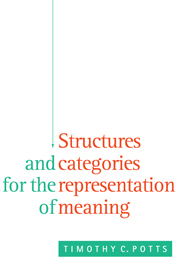6 - Basic categories: pointers
Published online by Cambridge University Press: 23 September 2009
Summary
THE CATEGORY OF POINTERS
If names of kinds of body are assigned to a basic category, it will immediately be asked how names of individual bodies, the paradigms of proper names, are to be categorized. Yet it will help to place that question in perspective if we postpone it in order to consider deictic expressions first. Some central examples of deictic expressions are the demonstrative pronouns ‘this’ and ‘that’, but also tenses and temporal adverbials like ‘yesterday’. In order to determine whether a sentence containing a deictic expression is true or false, we have to know what the latter indicates, which depends in turn upon the context (usually non-linguistic). Thus the sentence ‘That man is a Pole’ may be true said at one time in a certain place, but false at another time or in a different place. Similarly for a sentence like ‘Fred went to York yesterday’.
The term ‘deictic expression’ is current among linguists; many logicians use ‘indexical’ instead, but I prefer the linguists' term, because it is less theory-laden: to call these expressions ‘indexical’ already suggests an analogy with indexes in mathematical notation, whereas ‘deictic’ comes from the Greek verb ‘δεικνύω’, meaning ‘show’ or ‘point out’ (Latin ‘monstro’, incorporated into ‘demonstrative pronoun’). This only implies what has been said already, that the rôle of a deictic expression is to point to something outside the sentence in which it occurs (see Geach, 1962, section 22: ‘it works like a pointer, not like a label’).
- Type
- Chapter
- Information
- Structures and Categories for the Representation of Meaning , pp. 211 - 238Publisher: Cambridge University PressPrint publication year: 1994



